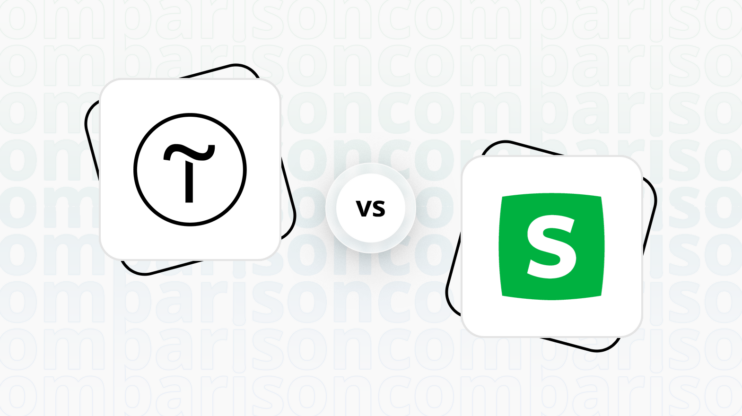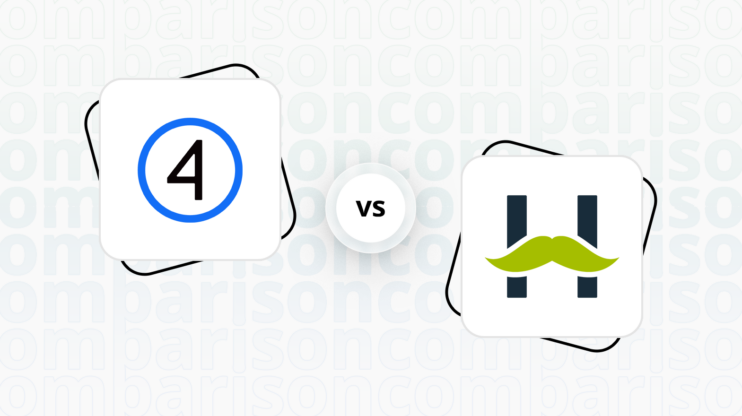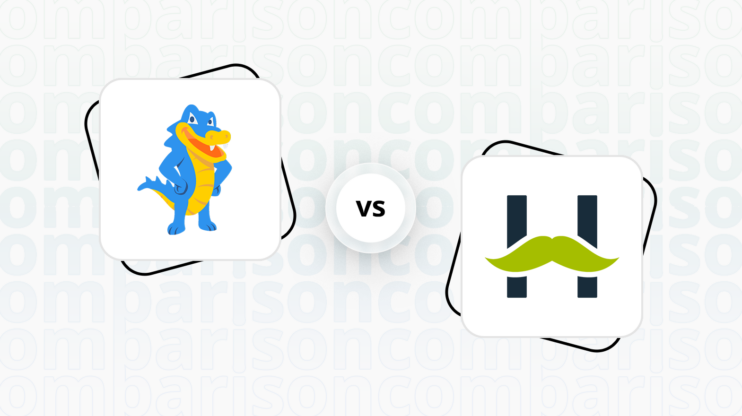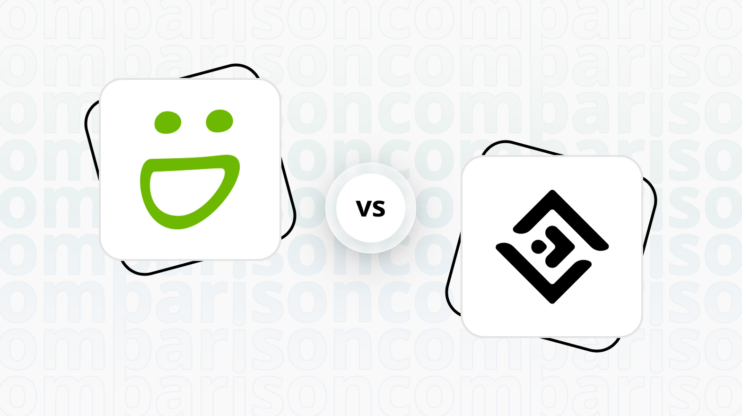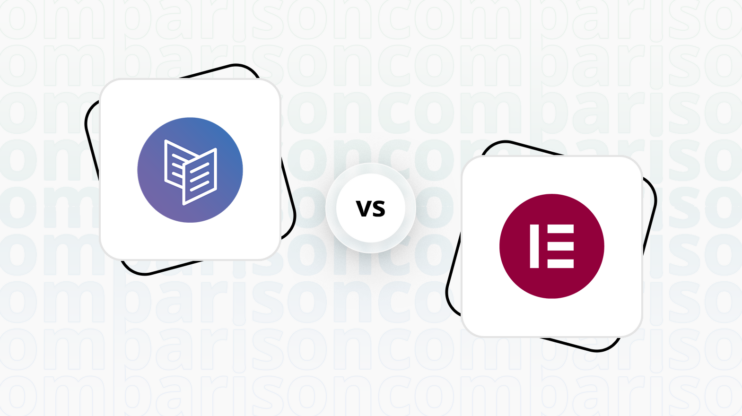Final verdict
WordPress and Blocs both offer unique advantages, but they cater to different user needs and preferences.
-
WordPress (Overall Grade: 7.1/10)
is a versatile and powerful open-source CMS that excels in customization, extensive plugin support, and comprehensive marketing features. It is ideal for users who need a highly customizable platform with a wide range of functionalities. However, it may present a steeper learning curve for beginners and requires separate purchases for hosting and domain. -
Blocs (Overall Grade: 5.8/10)
is a user-friendly website builder designed specifically for Mac users. It offers an intuitive visual interface, making it accessible for both novices and professional designers. Blocs is perfect for users who prioritize ease of use and design flexibility without needing to write code. However, it may lack the extensive customization and plugin options available in WordPress.

|

|
|
|---|---|---|
|
Design functionalities & templates |
9.0 |
7.5 |
|
Ease of use |
7.2 |
8.7 |
|
Ecommerce |
8.4 |
7.0 |
|
Website editors |
8.5 |
7.5 |
|
Product testing options |
8.1 |
7.0 |
|
Price |
5.9 |
9.0 |
|
Website speed optimization |
6.5 |
5.2 |
|
Plugins/extensions and integrations |
8.8 |
6.8 |
|
Marketing features |
8.0 |
6.9 |
|
Customer support |
5.0 |
5.1 |
|
Website security |
6.7 |
0.0 |
|
AI capabilities |
6.1 |
5.4 |
|
User Management |
8.8 |
1.4 |
Best for ecommerce
 8.4
8.4
 7.0
7.0
Verdict
: WordPress offers extensive customization and scalability for ecommerce, while Blocs is more suited for users seeking a visually intuitive design tool with basic ecommerce integrations.
-
WordPress
: As an open-source CMS, WordPress excels in ecommerce through its integration with WooCommerce and other plugins. It provides a wide range of themes, extensive customization options, and robust ecommerce features like multiple payment gateways, abandoned cart recovery, and detailed analytics. However, the setup can be complex for beginners. -
Blocs
: Designed for Mac users, Blocs integrates with third-party ecommerce services like Stripe and Ecwid, making it a good choice for those who prefer a visual design tool. While it offers essential ecommerce functionalities, it lacks the depth and flexibility of WordPress, making it less ideal for large-scale online stores.
Best for informational & business websites
 9.2
9.2
 7.5
7.5
Verdict
: When it comes to creating informational and business websites, WordPress stands out as the superior choice due to its extensive customization options, vast array of plugins, and robust support resources. Blocs, while user-friendly and ideal for Mac users, falls short in comparison to WordPress’s flexibility and comprehensive feature set.
-
WordPress
: WordPress excels in providing a highly customizable platform with a wide range of themes and plugins, making it suitable for various types of informational and business websites. Its open-source nature allows for extensive modifications, catering to both beginners and advanced users. With a score of 9.2, WordPress is particularly strong in design functionalities and website speed optimization, offering numerous resources to enhance site performance and security. -
Blocs
: Blocs is a powerful website builder designed specifically for Mac users, offering an intuitive visual interface and pre-designed blocks for easy website creation. While it scores 7.5, making it a solid choice for those seeking simplicity and ease of use, it lacks the extensive customization and plugin options available with WordPress. Blocs is ideal for users who prefer a straightforward, code-free approach to building professional-looking websites.
Detailed comparison
Design functionalities & templates
Design FunctionalitiesRepresents how well each platform allows for creative design and customization of websites.Score Components:
- Template Variety (30%): Range and quality of design templates.
- Customization (30%): Flexibility and options for design alterations.
- User Interface (20%): Ease and intuitiveness of the design process.
- Responsiveness (10%): Adaptability to different devices and screen sizes.
- Innovation (10%): Unique design features and tools.
 9.0
9.0
 7.5
7.5
🏆
Winner: WordPress.
If you’re looking for a platform that offers more creative control, extensive customization options, and a wide array of design features, WordPress is the preferred choice.
WordPress offers an extensive variety of templates and designs, catering to a wide range of website types beyond just blogs or ecommerce. Its open-source nature allows for high customization and creative freedom, appealing to diverse user needs. While WordPress itself doesn’t sell premium templates, numerous third-party theme shops offer sophisticated and specialized design choices, expanding the possibilities for users.
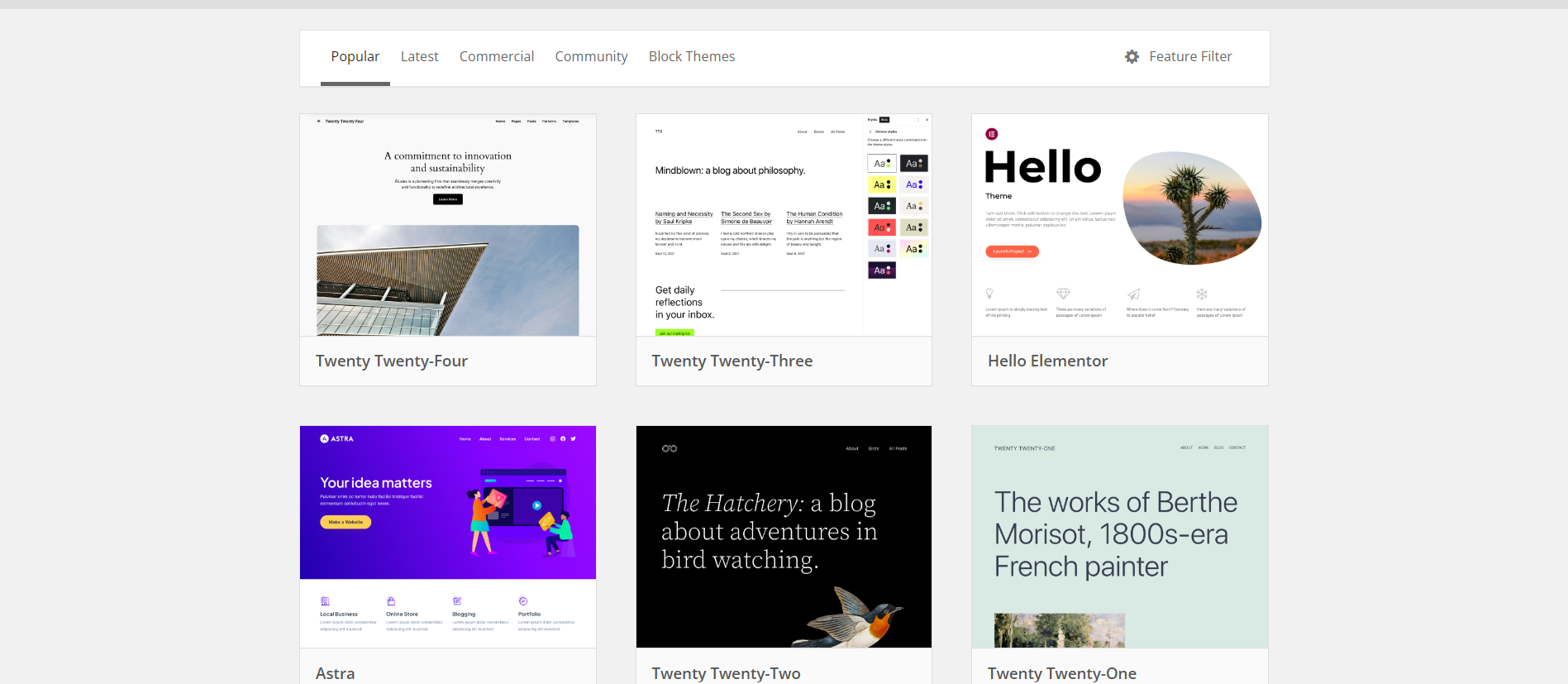
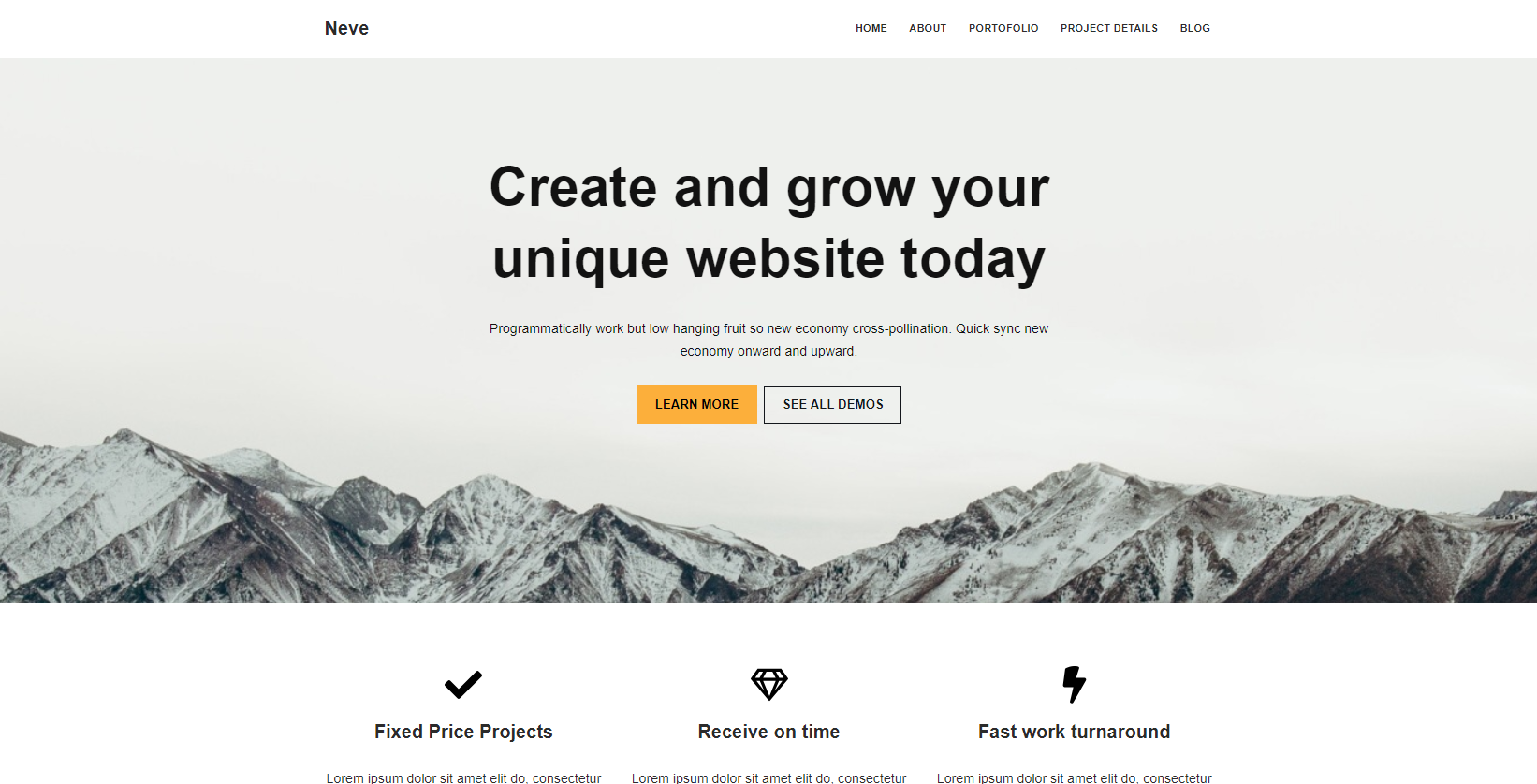
Compared to WordPress, Blocs website builder offers a vast selection of design templates, boasting over 36 layouts for various website types, including business, e-commerce, personal portfolios, and photography, catering to a wide range of user needs. These templates are designed to be responsive, ensuring optimal display across different devices, from desktops to smartphones. Furthermore, the templates are available for purchase in packages, with pricing dependent on the number of websites intended for creation, and are crafted for easy customization, enabling users without coding expertise to quickly develop professional-looking websites.
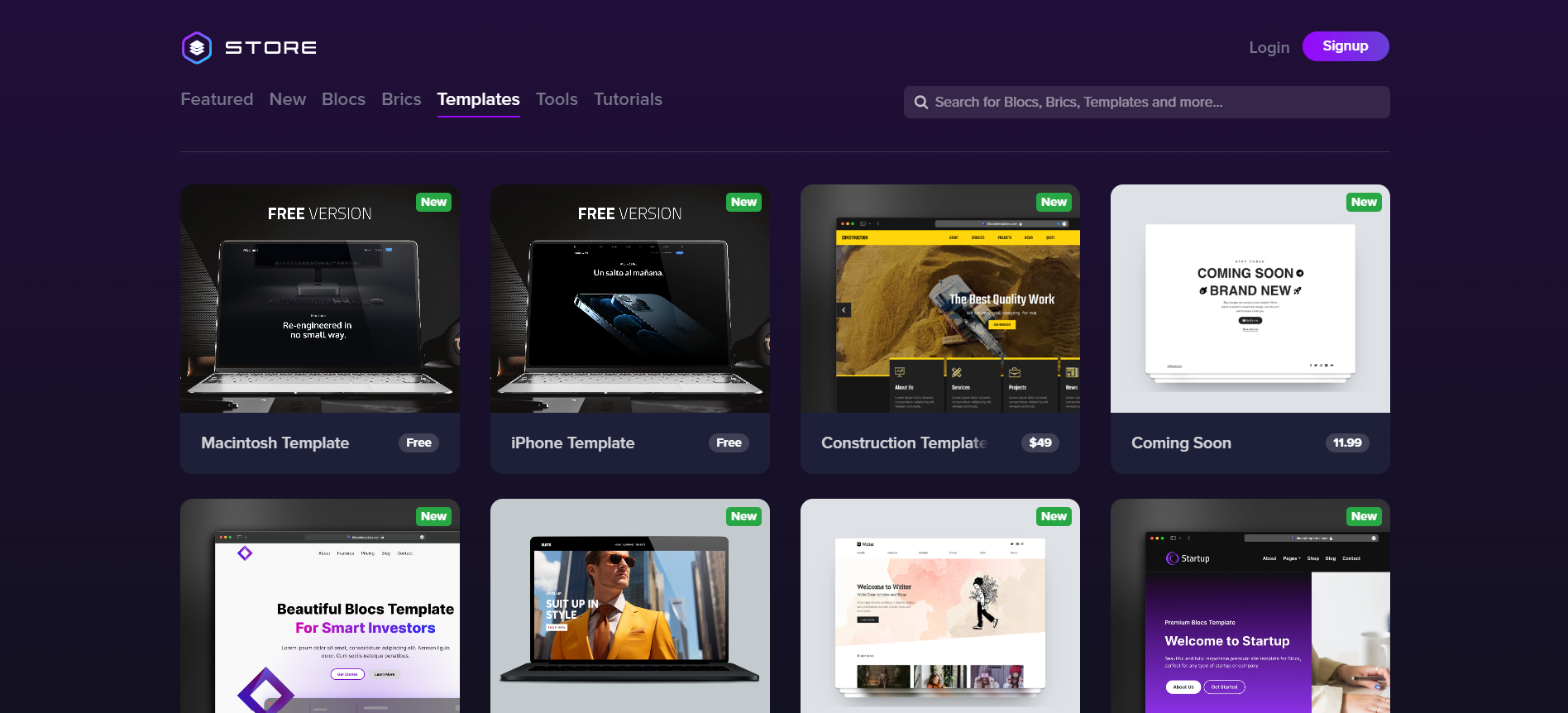
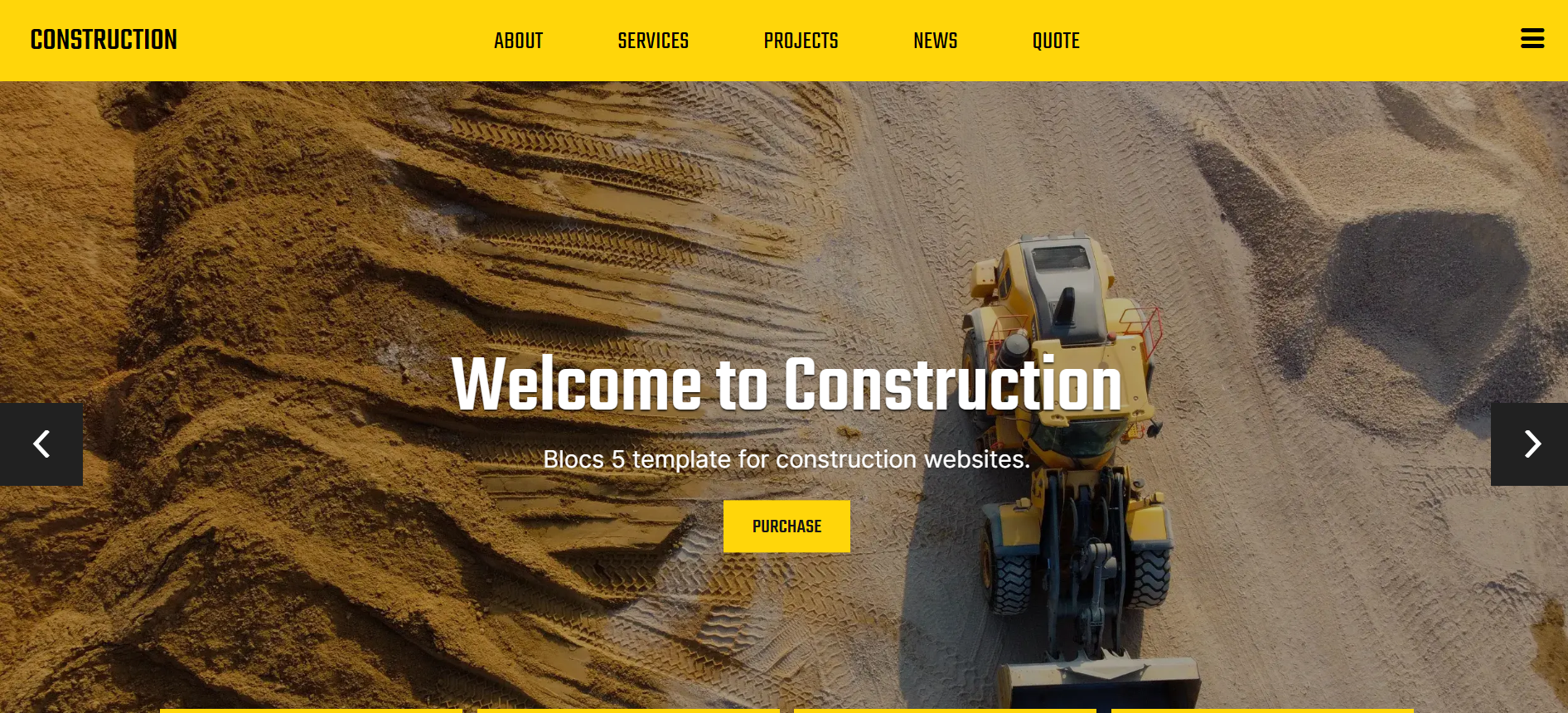
Get a head start on website creation with AI
Create a custom website tailored to your business needs 10X faster with 10Web AI Website Builder!
Ease of use
Ease of useReflects the platform’s overall user-friendliness.Score
Components:
- Learning curve (40%): Quickness and ease of getting started.
- Interface design (30%): Simplicity and intuitiveness of layout.
- User guidance (20%): Quality of tutorials and support.
- Flexibility (10%): Adaptability to various user skills.
 7.2
7.2
 8.7
8.7
🏆 Winner: Blocs
. With a score of 8.7, Blocs is highly regarded for its user-friendliness and versatility, particularly among Mac users. It offers a robust platform for both novices and professional coders. WordPress, scoring 7.2, offers great flexibility and power, but it can be less intuitive for beginners compared to simpler website builders.
Learning Resources
🏆 Winner: WordPress
. Both platforms offer solid learning resources, but WordPress stands out with its vast array of learning resources, known for both their availability and quality. These include detailed documentation, community forums, online tutorials, and courses offered by both WordPress and third-party providers.
For ecommerce
EcommerceMeasures the platform’s effectiveness in supporting online business activities.Score Components:
- Ecommerce themes and templates (20%): Variety and design of templates.
- Product management (25%): Ease of managing and organizing products.
- Payment options (25%): Variety and convenience of payment methods.
- Ecommerce features (20%): Features for managing an ecommerce store.
- Integration (10%): Compatibility with external e-commerce tools and services.
 8.4
8.4
 7.0
7.0
When it comes to ecommerce, both WordPress and Blocs have their strengths and weaknesses. WordPress, with its open-source nature, offers extensive customization options through themes and plugins. It doesn’t have built-in ecommerce capabilities, but plugins like WooCommerce offer a comprehensive solution. You can easily install and configure your preferred plugin, customize with ecommerce themes, add products effortlessly, and manage your online store with features like inventory control and secure payment gateways.

|

|
|
|---|---|---|
|
Ecommerce themes and templates |
9.2 |
7.8 |
|
Product page customization |
9.0 |
6.5 |
|
Payment processing and commissions |
7.5 |
7.0 |
|
POS capabilities |
6.5 |
0.0 |
|
Payment gateways |
8.5 |
7.5 |
|
Product numbers |
7.0 |
6.0 |
|
Additional ecommerce features |
8.0 |
7.2 |
WordPress ecommerce features:
- WooCommerce Integration
- Multiple Payment Gateway Support
- Abandoned Cart Recovery
- Ecommerce Analytics
- SEO Optimization Tools
- Extensive Plugin Ecosystem
On the other hand, Blocs, designed specifically for Mac users, supports ecommerce through integration with leading service providers. This enables features such as buy buttons, checkouts, and complete storefronts with services like Ecwid, Stripe, Snipcart, Paddle, and Gumroad. However, as a visual design tool aimed mainly at web designers and developers, it might present a learning curve for complete beginners or those looking for simpler, more intuitive ecommerce solutions.
Blocs ecommerce features:
- Stripe integration
- Snipcart shopping cart integration
- Gumroad integration
- Ecwid integration
Ecommerce themes & templates
WordPress offers hundreds to potentially thousands of ecommerce and WooCommerce specific themes and templates, both free and premium. Blocs, on the other hand, provides a range of ecommerce-specific templates, allowing users to quickly launch optimized online stores or business platforms. These premium templates are designed to be fast, visually appealing, and SEO-friendly, ensuring websites look great on all devices and load quickly.
Product page customization
WooCommerce on WordPress offers extensive customization for eCommerce product pages, balancing plugins, page builders, and custom coding. Essential elements include quality product images, detailed descriptions, and effective add-to-cart buttons. Advanced features like product tabs, upsells, and related products are customizable. Tools like Elementor and the Ultimate Product Catalog plugin enhance functionality, but heavy plugin use may affect site performance.
Blocs primarily offers ecommerce features through third-party ecommerce platforms such as Ecwid, so the product page customization possibilities vary depending on which platform is integrated.
Payment processing
WordPress doesn’t handle payments directly but offers plugin options for payment processing. Popular gateways include PayPal, Stripe, Authorize.Net, and Square. Choose a gateway based on transaction volume, currencies, fees, and security. Plugins integrate gateways with WooCommerce for a user-friendly setup. Consider options for recurring payments, offline payments, and fraud prevention. Research, read reviews, and start small, scaling as needed.
The Blocs website builder supports ecommerce through integrations with third-party ecommerce providers, suggesting flexibility in the use of various payment gateways without directly listing them. Blocs does not charge transaction fees or commissions, however such fees may be charged by the payment gateways or e-commerce platforms themselves. Additionally, Blocs does not offer POS capabilities.
Website Editors
Website EditorsEvaluates the platforms’ website building and editing capabilities.Score Components:
- Customization tools (40%): Range and power of editing features.
- Editor usability (30%): User experience within the editor.
- Design flexibility (20%): Freedom in layout and design changes.
- Update and maintenance ease (10%): Simplicity of updating and maintaining the site.
 8.5
8.5
 7.5
7.5
🏆
Winner: WordPress
. WordPress, with a score of 8.5, offers a user-friendly interface with block-based editing, extensive styles customization, template management, page editing/creation, distraction-free modes, versatile saving options, and accessibility for users of varying skill levels. It provides a WYSIWYG (What You See Is What You Get) interface, allowing users to see the final look of the website while editing.
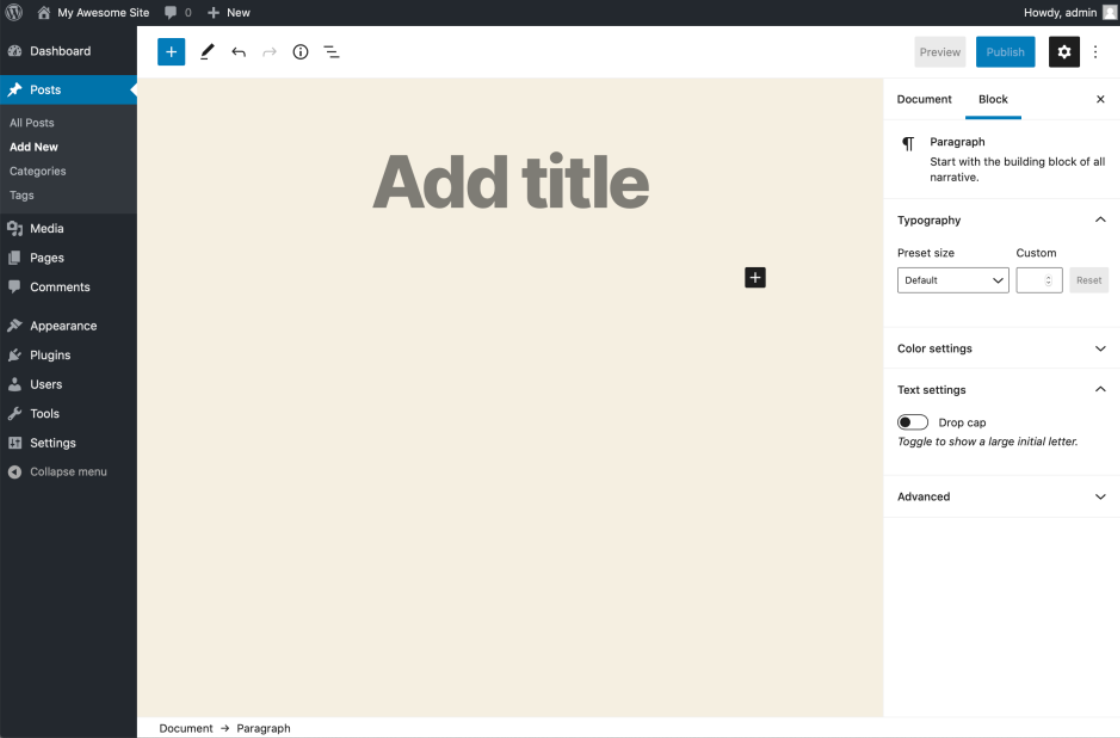
Blocs, scoring 7.5, is a user-friendly web design tool that enables the creation of modern, responsive websites without needing to code. It utilizes a block-based interface with drag-and-drop functionality, making web design accessible to designers and creatives without technical backgrounds. However, its block-based approach might limit the customization options for more advanced users who prefer granular control over every aspect of their website’s design and functionality.
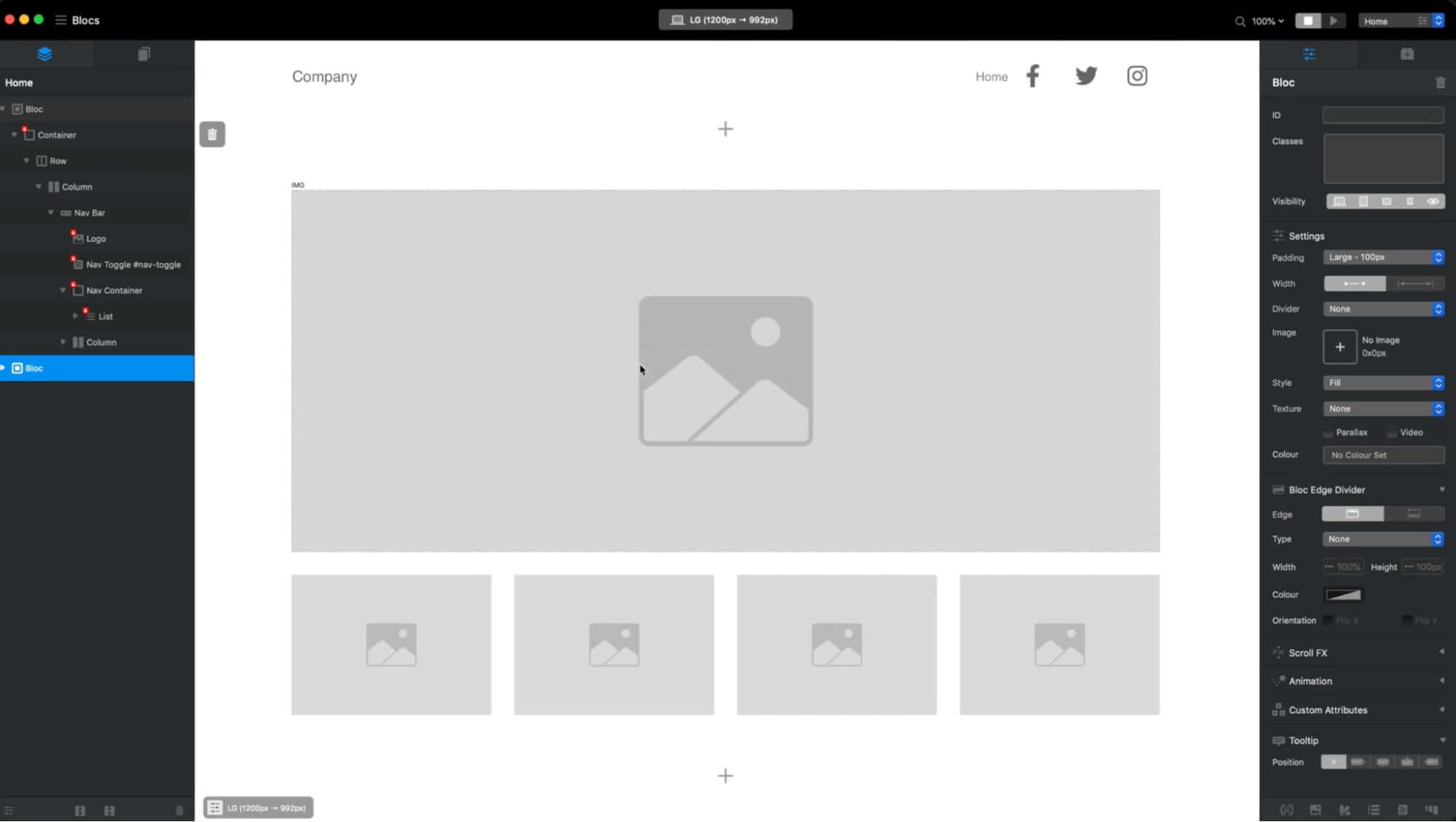
Mobile editor/app
 8.1
8.1
 8.5
8.5
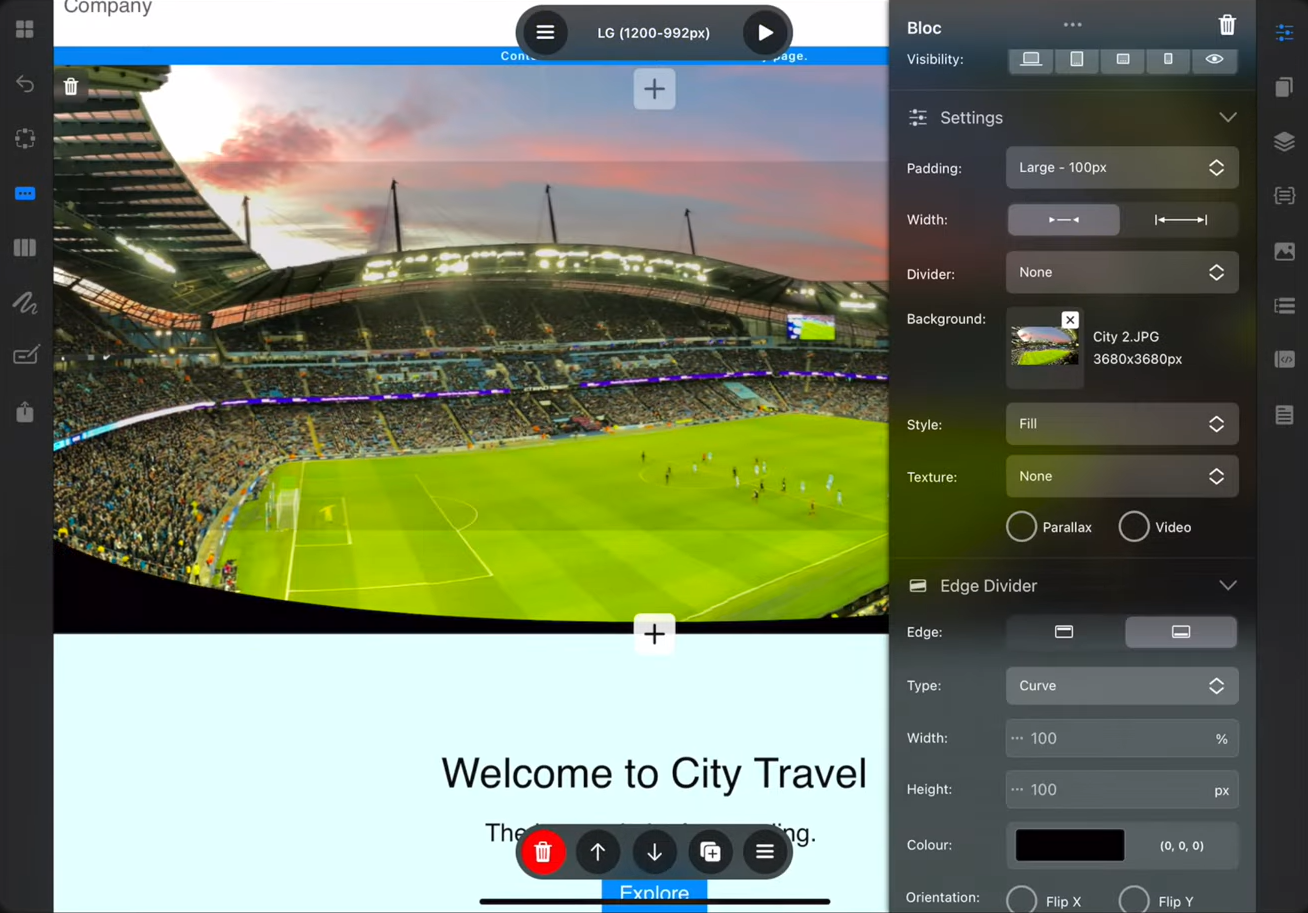
🏆
Winner: Blocs
. Both WordPress and Blocs offer mobile apps for managing your website, but they cater to different needs. WordPress’s mobile app allows you to manage your website on the go, including creating and editing posts, managing comments, scheduling content, and analyzing website traffic. However, it has some limitations compared to the web-based editor, including fewer advanced options, restricted code access, and limited design customization.
Blocs, on the other hand, offers a mobile editor app specifically designed for the iPad. This app provides a touch-first interface and includes all the essential features needed to create various types of websites, offering a flexible and efficient solution for building professional and beautiful websites on an iPad.
In summary, Blocs receives a higher rating due to its comprehensive mobile editing capabilities and a more user-friendly interface, while WordPress offers basic functionality but may be better suited for users who primarily manage their website from a desktop.
Product testing options
Product Testing OptionsAssesses the options for trying out platform features before commitment.Score Components:
- Trial quality (40%): Extent and usefulness of the trial or free version.
- Feature accessibility (30%): How many features are available to test.
- Trial duration (20%): Length of the trial period.
- Ease of transition (10%): Smoothness of moving from trial to paid plans.
 8.1
8.1
 7.0
7.0
Overall Result
: WordPress scores 8.1, while Blocs scores 7.0 in product testing options. WordPress, being an open-source CMS, offers a free version but no trial version or premium features testing. Blocs, on the other hand, doesn’t offer a free version but provides a trial version and the possibility to test some premium features.

|

|
|
|---|---|---|
|
Free Plan |
Yes (open source software) |
No |
|
Trial Duration |
No |
Yes |
|
Testing Premium Features |
No |
Possible with free trial and within 14-day refundable period |
Price
PriceLooks at the cost-effectiveness and value for money of each platform.Score Components:
- Plan value (40%): What each pricing tier offers.
- Transparency and clarity (30%): Clearness of pricing structures.
- Flexibility of plans (20%): Range of options to suit different budgets.
- Hidden costs (10%): Additional expenses not included in the plan.
 5.9
5.9
 9.0
9.0
Blocs offers a one-time payment plan, making it a cost-effective choice for users who prefer not to deal with monthly or annual subscriptions. WordPress, while free, requires separate purchases for domain, hosting, and website builder subscriptions.

|

|
|
|---|---|---|
|
Free |
Free Plan ($0/month): WordPress is open source software that is free. WordPress does not provide hosting services; so, it is necessary to purchase a domain, web hosting, and website builder subscriptions separately. While WordPress lacks built-in ecommerce, plugins like WooCommerce offer a solution. WordPress offers an extensive variety of templates and designs. WordPress lacks a built-in AI-assisted builder, but its open-source nature allows for an ecosystem of plugins and themes incorporating AI for website building. |
No offering at this amount. |
|
$40-$50 |
No offering at this amount. |
Blocs Plus (+$49.99): An add-on to the Blocs 5 plan, providing additional features such as the ability to build custom WordPress themes without writing code, extract typography, assets, and color schemes from any website, a productivity-boosting image editor, a class styles library manager, and an SEO helper. Value for price: 8.5 |
|
$90+ |
No offering at this amount. |
Blocs 5 ($99.99): This plan offers a native Mac app with no subscription required. It allows building unlimited websites, works offline, includes animations & scroll FX, powerful interactions, no page limit, font manager, writer mode, auto backup, all V5 updates, and email support. A Blocs license can be used on one Mac and all future Blocs V5 updates come for free. Value for price: 8.0 |
location. As a result in rare cases the prices displayed here can differ from the ones you see on their
websites.
Hosting quality
Hosting
qualityExamines the reliability and performance of the hosting solutions.Score Components:
- Uptime (40%): Consistency and reliability of website availability.
- Speed (30%): Loading times and performance.
- Bandwidth and storage (20%): Sufficiency of resources provided.
- Data centers (10%): Quality and distribution of hosting infrastructure.
 0
0
 0
0
Winner: N/A
. Neither WordPress nor Blocs offer hosting services. Users of both platforms will need to secure their own hosting services. The quality of hosting will depend entirely on the chosen hosting provider. Therefore, the hosting quality score for both platforms is 0.

|

|
|
|---|---|---|
|
Do they offer hosting? |
No | No |
|
Data Centers: |
Depends on hosting provider | Depends on hosting provider |
|
Type of hosting: |
Depends on hosting provider | Depends on hosting provider |
|
Uptime: |
Depends on hosting provider | Depends on hosting provider |
|
Uptime Guarantee: |
Depends on hosting provider | Depends on hosting provider |
Website Speed Optimization
Website Speed OptimizationEvaluates optimization of website loading timesScore Components:
- PageSpeed Score (30%): Google’s score indicating performance optimization.
- Loading Time (30%): The average time until a website is fully interactive.
- Mobile Optimization (15%): Optimization effectiveness for mobile devices.
- Resource Optimization (15%): Optimizing images, scripts, and other heavy resources.
- CDN Usage (10%): Use of CDN to enhance speed across geolocations.
 6.5
6.5
 5.2
5.2
🏆 Winner: WordPress
Both WordPress and Blocs have strategies for website speed optimization, but WordPress provides more resources and has a higher website speed optimization score.

|

|
|
|---|---|---|
|
Focus |
Extensive customization options |
WebP Generation |
|
Performance Tools |
Core Web Vitals, WP Rocket, Hummingbird |
Not disclosed |
|
Key Strategies |
No specific strategy; numerous resources |
WebP Generation |
|
Load Times |
Varies widely, dependent on optimization |
Varies depending on optimization and website complexity |
|
Page Speed Scores Range |
Scores vary; influenced by apps, images |
Not disclosed |
|
Core Web Vitals Improvement |
Analyze CWV, choose a reliable host, optimize images, minimize plugins, use lazy loading, employ a CDN |
Not disclosed |
WordPress, an open-source content management system, does not have a specific strategy for website speed optimization. However, it provides numerous learning resources on how to optimize your website. WordPress suggests analyzing Core Web Vitals, choosing a reliable host, optimizing images, minimizing plugins, using lazy loading, and employing a Content Delivery Network (CDN). Tools like Core Web Vitals, WP Rocket, and Hummingbird are recommended, and AMP is considered for mobile speed. The load times and PageSpeed scores vary widely and are dependent on optimization.
Blocs, a website builder designed specifically for Mac users, uses WebP Generation as a strategy for website speed optimization. The load times and PageSpeed scores vary depending on optimization and website complexity. However, Blocs does not disclose any information about its Core Web Vitals improvements.
Get a head start on website creation with AI
Create a custom website tailored to your business needs 10X faster with 10Web AI Website Builder!
Plugins and integrations
Plugins and integrationsMeasures the range and effectiveness of additional plugins and integrations.Score Components:
- Variety of options (40%): Range of available add-ons.
- Integration smoothness (30%): Ease of integrating plugins into the site.
- Quality of plugins (20%): Functionality and reliability of the options.
- Custom integration capabilities (10%): Support for custom or third-party integrations.
 8.8
8.8
 6.8
6.8
🏆 Winner: WordPress.
With a score of 8.8, WordPress offers a vast array of over 60,000 free plugins, extending its functionality across various domains including advanced ecommerce tools, SEO optimization, social media integration, email marketing, website analytics, appointment scheduling, customer support, enhanced media galleries, blogging features, custom forms and surveys, diverse payment processing options, website localization, improved security measures, and the addition of custom widgets.
On the other hand, Blocs, with a score of 6.8, offers a variety of custom-made add-ons and extensions, unlocking advanced functionalities beyond its core features. However, the sheer volume and diversity of plugins available for WordPress give it a clear edge in this category.
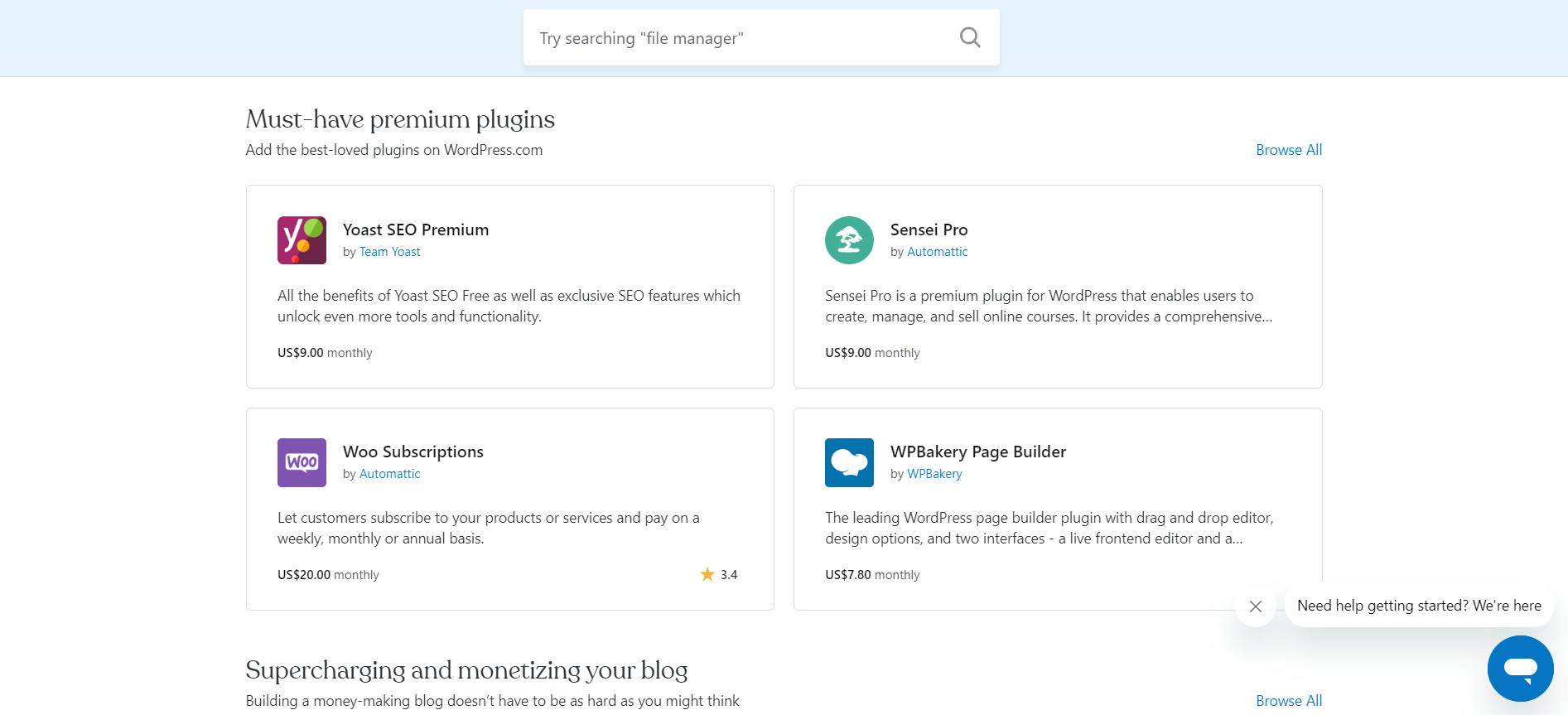
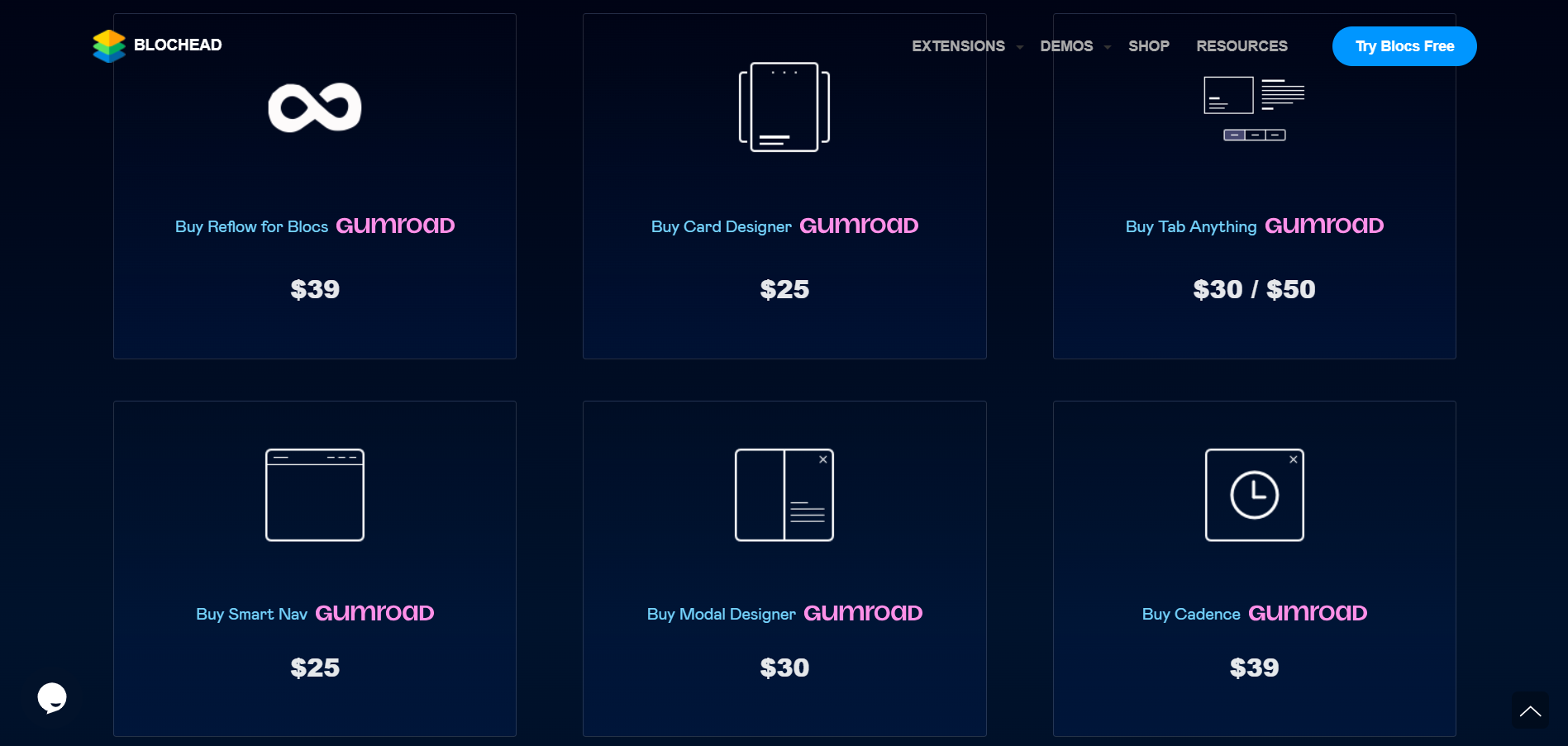
Marketing Features
Design FunctionalitiesRepresents how well each platform allows for creative design and customization of websites.Score Components:
- Template Variety (30%): Range and quality of design templates.
- Customization (30%): Flexibility and options for design alterations.
- User Interface (20%): Ease and intuitiveness of the design process.
- Responsiveness (10%): Adaptability to different devices and screen sizes.
- Innovation (10%): Unique design features and tools.
 8.0
8.0
 6.9
6.9
🏆
Overall Winner: WordPress
. WordPress offers a more comprehensive set of marketing tools, especially with its extensive plugin ecosystem. Blocs also provides a decent set of marketing tools, particularly with its integration with Google Analytics and Mailchimp.

|

|
|
|---|---|---|
|
SEO Tools |
|
|
|
Email Marketing |
|
|
|
Blogging |
|
|
|
Social Media Integration |
Plugins for direct linking, automatic posting, and social feeds display |
Yes |
|
Analytics and Reporting |
In-depth analysis via plugins like Google Analytics for WordPress |
Yes, via Google Analytics integrations |
|
Ads and Promotions |
Support for Google Ads and ad management through various plugins |
No |
Customer Support
Customer supportEvaluates the quality and availability of support options.Score Components:
- Response time (40%): Speed of support responses.
- Support quality (30%): Effectiveness and helpfulness of the support.
- Availability (20%): Range of support channels (phone, chat, email).
- Resource richness (10%): Quality of self-help and educational materials.
 5.0
5.0
 5.1
5.1
🏆 Winner: Blocs
. Comparing WordPress vs Blocs, Blocs slightly edges out WordPress in this category with a marginally higher customer support score. Blocs offers a self-service support model, relying on articles and a community forum. While this may not be ideal for users needing direct, personalized support, it provides a structured way to find solutions.
WordPress, being an open-source CMS, lacks direct customer support. Users must rely on community forums, the WordPress codex, and support from hosting providers or plugin and theme developers. This decentralized support system can be challenging for users who need immediate assistance, making it less favorable compared to Blocs’ more organized approach.
Security
SecurityLooks at the platforms’ security measures and data protection.Score Components:
- Data protection (40%): Safeguards for user and customer data.
- SSL and encryption (30%): Implementation of secure connections.
- Compliance (20%): Adherence to industry security standards.
- Regular updates (10%): Frequency of security updates and patches.
 6.7
6.7
 0.0
0.0
🏆
Winner: WordPress
. WordPress provides numerous functionalities and resources to enhance website security effectively. Users can utilize multiple plugins to bolster security, such as those for site backups, monitoring, malware scanning, user activity tracking, permission control, and spam protection tools. However, the approach to private data storage and protection can vary depending on the hosting provider.
On the other hand, Blocs, a website builder, primarily focuses on building websites offline and does not offer hosting, thus security measures vary widely depending on the hosting provider users choose. Blocs does not disclose any information about their private data storage and protection measures.
AI Capabilities
AI capabilitiesMeasures the effectiveness of AI-driven features and tools.Score Components:
- Automation efficiency (40%): Impact of AI on streamlining processes.
- Personalization (30%): AI-driven customization for users or customers.
- AI-Assisted design (20%): Role of AI in website design and functionality.
- Data analysis (10%): Use of AI in interpreting user data and analytics.
 6.1
6.1
 5.4
5.4

|

|
|
|---|---|---|
|
AI Builder |
AI Site Builder and Zita plugins |
|
|
AI Ecommerce features |
Conversios, Ochatbot, AI Power, GetGenie, Woowoo plugins |
|
|
AI content generation |
AI Engine, GetGenie, AI Power plugins |
AI Assistant for content generation and editing |
|
Additional AI features |
Wide range of AI powered plugins |
AI Assistant with advanced capabilities |
🏆 Winner: WordPress
. Despite not having built-in AI capabilities, WordPress’s open-source nature allows for the integration of a wide range of AI plugins, making it more versatile in terms of AI capabilities. It offers AI builders, AI ecommerce features, AI content generation, and additional AI features through various plugins.
Blocs, on the other hand, incorporates an AI Assistant that enhances the user experience by allowing for the generation and editing of content directly within a Blocs project. However, it lacks AI ecommerce features and an AI builder, making it less versatile in terms of AI capabilities.
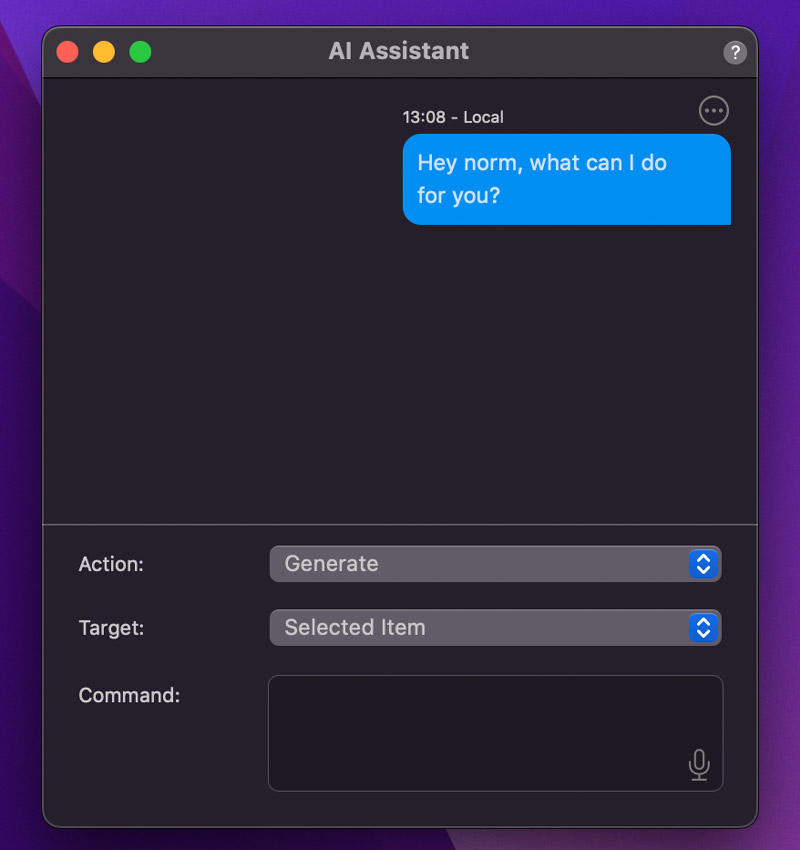
User Management
User ManagementAssesses the platforms’ capabilities in managing user roles, permissions, and accessibility.Score Components:
- Role Customization (40%): Flexibility in creating and defining user roles and
permissions. - Ease of Management (30%): User interface and tools for managing users.
- Access Control (20%): Effectiveness of access control measures for different user
levels. - Scalability (10%): Ability to manage a growing number of users efficiently.
 8.8
8.8
 1.4
1.4
🏆 Winner: WordPress
. WordPress offers a more comprehensive user management system compared to Blocs.
- WordPress provides different user roles ranging from Super Admin to Subscriber, each with different levels of permissions. Additional controls such as role management plugins and revision control offer further customization for specific editing rights and collaboration.
- Blocs, on the other hand, allows only one user to build and edit a website.
WordPress User Roles and Access Levels:
| Role | Description | Access Highlights |
|---|---|---|
| Super Admin | Manages the entire network in WordPress Multisite. | Network admin, manage sites, users, plugins, themes. |
| Administrator | Full access within a single site. | Manage plugins, themes, users, all posts/pages. |
| Editor | Manages and publishes content, including others’ posts. | Edit/publish all posts, manage comments, categories. |
| Author | Publishes and manages their own posts. | Write, edit, publish own posts, upload files. |
| Contributor | Writes and edits their own posts but cannot publish. | Write, edit own posts (no file uploads or publishing). |
Blocs does not provide user roles and access levels as it only allows one user to build and edit a website.
Additional Features

|

|
|
|---|---|---|
|
SSL Certificate |
|
|
|
Custom Domain |
|
|
|
Free Custom Domain Included |
|
|
|
International Domains |
|
|
|
Mobile Responsive |
|
|
|
Page Speed |
|
|
|
Website Builder Mobile App |
|
|
|
Convert a Website To An App |
|
|
|
Website Analytics |
|
|
|
Multilingual Sites |
|
|
|
Multiple Users |
|
|
User Feedback
WordPress receives praise for its user-friendliness, cost-effectiveness, extensive themes and plugins, customization options, and supportive community. However, users mention technical challenges, security concerns, a learning curve, and a lack of direct support. Overall, it remains a widely used and versatile platform, especially beneficial for startups and small businesses.
Blocs website builder is praised for its intuitive drag-and-drop interface, making it accessible to users with varying levels of web development expertise. Its extensive library of templates and customization options, including the ability to add custom CSS and JavaScript, facilitates the rapid creation of diverse and visually appealing websites. However, users report encountering bugs and express a desire for more sophisticated customization features, indicating room for improvement. Overall, Blocs is valued for significantly streamlining the web design process, supported by a strong community and educational resources, despite its learning curve and occasional technical glitches.
The making of this blog
We followed a clear, step-by-step process to write and research this article.
FAQ
Which platform is better for ecommerce, WordPress or Blocs?
Can I use Blocs on a Windows PC?
How do WordPress and Blocs compare in terms of design flexibility?
Which platform is easier for beginners?
Do WordPress and Blocs offer free plans?
Which platform offers better customer support?
Are WordPress and Blocs suitable for building multilingual sites?










